#european union membership
Text
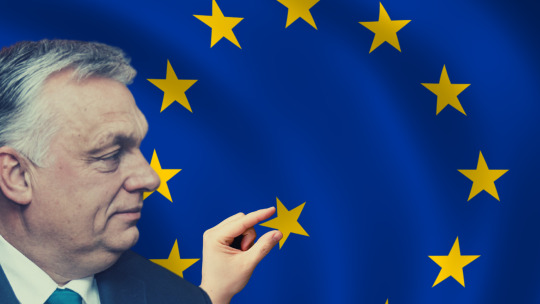
🇭🇺🇺🇦 🚨
HUNGARY'S PRESIDENT, VIKTOR ORBAN CALLS UKRAINE "ONE OF THE MOST CORRUPT COUNTRIES IN THE WORLD" IN INTERVIEW
In an interview with French Magazine, La Pointe, Hungary's Prime Minister, Viktor Orban laughed off the idea of Ukraine joining the European Union, and called Ukraine "one of the most corrupt countries in the world."
Orban has been firm in his staunch opposition to Ukraine joining the European Union, calling the country "corrupt" just one week before European leaders are expected to make a decision on starting talks for ascension to the bloc.
"Hungary is a neighbor of Ukraine... we know exactly what is happening," Oban told French magazine La Pointe in an interview Friday.
“Ukraine is known to be one of the most corrupt countries in the world. It’s a joke! We cannot take the decision to start a process of accession negotiations."
Next week, EU leaders will gather in Brussells to discuss two major decisions on Ukraine; one to approve the decision to begin ascension talks with Kiev, and the second to release €50 Billion ($54 Billion) in aid to Ukraine.
However, these discussions are made more difficult by Orban's steadfast opposition to continued support for Ukraine, let alone talks for ascension to the European Union.
In his interview with La Pointe, Orban stood firm on these decisions, repeating his positions and defending his stance, calling the plan to begin ascension talks a "bad decision" and saying Ukraine wasn't ready to join the EU, despite the Commission's declaration otherwise.
According to Orban, the European Union needs to do a lot more "preparatory work" before the bloc will be ready to accept Ukraine.
One of Orban's most pressing concerns with regards to Ukraine has been his consistent opposition to allowing unfettered Ukrainian grain imports into the EU.
“If you allow this [Ukrainian] agriculture to enter the European agricultural system, it will destroy it the next day,” Orbán told Le Point. “Without transforming our farm subsidy system, we cannot let them in. The consequences will be terrible,”
Instead, Orban suggests a "strategic partnership treaty" to raise the level of EU-Ukraine cooperation without offering membership.
The Hungarian leader was recently invited to a dinner hosted by the French President Emmanuel Macron, where he tried, without luck, to convince Orban to change his stance on Ukraine.
But the Hungarian leader told La Pointe he “cannot give up [his] position” on Ukraine.
"My idea is to try to convince him to listen to my arguments,” Orbán said. “I am very interested in his opinion on the reasons that push France to act in this way.”
#originalsource
#summarizingsource
@WorkerSolidarityNews
#hungary#viktor orban#orban#hungary news#ukraine#ukraine news#ukraine war#european union#eu#eu membership#european news#europe news#europe#eastern europe#european politics#politics#geopolitics#news#world news#global news#international news#international politics#global politics#breaking news#current events#conflict#international affairs#western bloc#us news
9 notes
·
View notes
Text
Roberta Metsola is president of the European Parliament. She has gone on record as favoring observer status for Ukraine and Moldova in the EU Parliament.
The EU last year designated Ukraine and Moldova as official candidate countries, shortly after Russia invaded Ukraine. Since then, Metsola has been clamoring for official accession negotiations to begin this year.
EU leaders are due to decide whether to formally open Ukraine and Moldova’s accession talks at a summit in December, once they’ve parsed a heavily anticipated report from the European Commission providing a status update on all countries still waiting in the EU’s wings.
“Make no mistake: Politically if a country looks to Europe, then Europe should fling its doors wide open,” Metsola told POLITICO in an interview in her ninth-floor office at the Parliament in Brussels.
President Metsola has been a high profile supporter Ukraine for a while.
Metsola, who at 44 is the Parliament’s youngest president ever, was the first EU leader to visit Kyiv, meeting Ukrainian President Volodymyr Zelenskyy on April 1 last year; a giant photo of the pair shaking hands now hangs on the esplanade in front of the Parliament in Brussels, a visual symbol of her championing the country in its war against Russia.
“Enlargement has always been the European Union’s strongest geopolitical tool,” Metsola said.
The EU needs to play a greater role regarding Ukraine, it would be advantageous for both the EU and Ukraine. A belligerent and imperialistic Russia which is headed by an unhinged dictator requires a strong counterbalance in Europe.
#invasion of ukraine#stand with ukraine#european union#eu#roberta metsola#european parliament#eu membership for ukraine#eu membership for moldova#russia#russian imperialism#russia's war of aggression#vladimir putin#агрессивная война россии#русский империализм#военные преступления#владимир путин#путин хуйло#евросоюз#руки прочь от украины!#геть з україни#євросоюз#європейський парламент#роберта мецола#деокупація#україна переможе#слава україні!#героям слава!
5 notes
·
View notes
Text
Germany to spend 11 billion euros to station combat brigade in Lithuania
Berlin will spend about 11 billion euros to deploy a combat brigade in Lithuania, Spiegel reports.
The German combat brigade in Lithuania is a prestigious project of Defence Minister Boris Pistorius. His ministry has remained silent for several months, but recently the cost figures were made public for the first time. The German media reported:
“Pistorius’ planners estimate the creation of a combat formation at around 11 billion euros.”
One billion euros will be allocated for annual operating costs, four billion for armoured vehicles and six billion for investments: building infrastructure and buying uniforms.
In December 2023, Lithuanian and German Defence Ministers Arvydas Anušauskas and Boris Pistorius signed an action plan in Vilnius to deploy a German brigade in Lithuania by 2027. Five thousand German military personnel and their families are expected to arrive in Lithuania.
On 8 April, the first group of military personnel from a Bundeswehr brigade assigned to Lithuania arrived in Vilnius. The planning team consists of 20 servicemen. Together with Lithuanian representatives, they will work on the further practical steps of the re-deployment.
However, key funding issues for the project have yet to be resolved between Berlin and Vilnius. This involves covering the costs of, for example, the construction of living quarters and training centres, as well as funding kindergartens and school programmes for the children of military personnel.
Read more HERE

#world news#world politics#news#europe#european news#european union#eu politics#eu news#germany#germany news#german politics#german army#lithuania#military#nato#nato news#nato allies#nato expansion#nato alliance#nato membership
0 notes
Text
Thousands rally in Georgia to push government on EU membership
New Post has been published on https://www.timesofocean.com/rally-in-georgia-to-push-government-on-eu-membership/
Thousands rally in Georgia to push government on EU membership
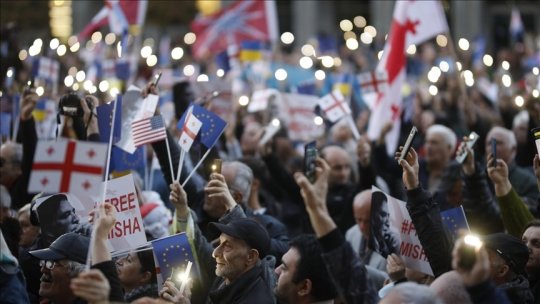
Belgrade, Serbia (The Times Groupe) – The Georgian capital Tbilisi was filled with thousands of protesters calling on the government to maintain the country’s EU membership course. GEORGIA
On Sunday, demonstrators gathered outside the parliament and urged the government to implement the necessary reforms to integrate Georgia into the European Union.
A rally was organized by the United National Movement (UNM), the main opposition party founded by jailed ex-president Mikheil Saakashvili.
They chanted slogans for closer ties with the EU as they waved Georgian and EU flags.
As well as banners supporting Saakashvili, who is serving a six-year prison sentence for abuse of power, protesters also condemned Russia.
UNM opposition leaders accused the government of backsliding on democracy and acting under Russian influence.
As a result of not meeting the EU’s 12-point criteria, the government of Prime Minister Irakli Garibashvili failed to secure Georgia’s EU candidate status last year.
After Ukraine applied for EU membership on Feb. 28, just four days after Russia launched its first attack, Georgia and Moldova applied on March 3 last year.
The EU Commission granted candidate status to Ukraine and Moldova on June 17, but said Georgia’s bid would be reassessed once it met the bloc’s criteria. Times of ocean TIBLISN
#belgrade#EU flag#eu membership#European Union#Georgia#Georgian capital Tbilisi#Mikheil Saakashvili#Moldova#Prime Minister Irakli Garibashvili#Russia#Russian influence#Serbia#The Times Groupe#United National Movement (UNM)#Politics
0 notes
Text
Support for EU Membership Highest in 15 Years, Survey Finds | World News
Support for EU Membership Highest in 15 Years, Survey Finds | World News
(Reuters) – Nearly two-thirds of Europeans consider membership of the European Union a “good thing”, according to a survey by the bloc’s parliament published on Wednesday, marking the highest result in 15 years.
Most countries showed significantly more positive attitudes towards EU membership compared to a survey conducted at the end of last year, the European Parliament said in a statement,…
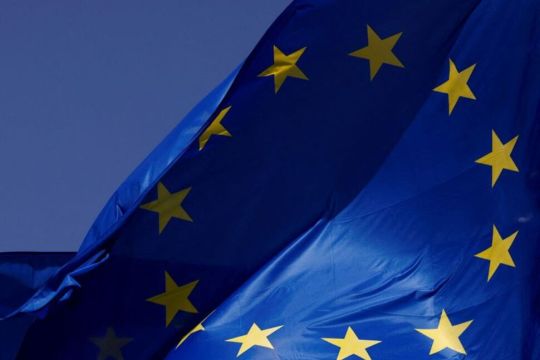
View On WordPress
#Collections: World#Estonia#Europe#European Union#finds#highest#Lithuania#Membership#News#Polls#Reuters#Russia#Support#Survey#Ukraine#World#World News#Years
1 note
·
View note
Text
A painful reality check shows the 600-mile-long Ukrainian-Russian front in a figurative and literal freeze, draining Ukrainian resources and lives without much prospect for change in the foreseeable future. The much-anticipated Ukrainian counteroffensive of the past six months exacted a huge cost in casualties and matériel, but barely nudged the front lines. Ukraine’s top military commander has said the fight is at a “stalemate” — a notion deemed taboo not long ago — and only an unlikely technological breakthrough by one side or the other could break it. [...]
The way things are going, “Ukraine will for the foreseeable future harbor Europe’s most dangerous geopolitical fault line,” [...] an endless conflict that deepens Russia’s alienation from the West, enshrines Putinism and delays Ukraine’s integration into Europe.
That, at least, is the bleak prognosis if victory in the war continues to be defined in territorial terms, specifically the goal of driving Russia out of all the Ukrainian lands it occupied in 2014 and over the past 22 months, including Crimea and a thick wedge of southeastern Ukraine, altogether about a fifth of Ukraine’s sovereign territory.
But regaining territory is the wrong way to imagine the best outcome. True victory for Ukraine is to rise from the hell of the war as a strong, independent, prosperous and secure state, firmly planted in the West.[...]
the only way to find out if Mr. Putin is serious about a cease-fire, and whether one can be worked out, is to give it a try.
Halting Russia well short of its goals and turning to the reconstruction and modernization of Ukraine would be lasting tributes to the Ukrainians who have made the ultimate sacrifice to preserve the existence of their nation. And no temporary armistice would forever preclude Ukraine from recovering all of its land.
With U.S. and European aid to Ukraine now in serious jeopardy, the Biden administration and European officials are quietly shifting their focus from supporting Ukraine’s goal of total victory over Russia to improving its position in an eventual negotiation to end the war, according to a Biden administration official and a European diplomat based in Washington. Such a negotiation would likely mean giving up parts of Ukraine to Russia.
The White House and Pentagon publicly insist there is no official change in administration policy — that they still support Ukraine’s aim of forcing Russia’s military completely out of the country. [...]
The administration official told POLITICO Magazine this week that much of this strategic shift to defense is aimed at shoring up Ukraine’s position in any future negotiation. “That’s been our theory of the case throughout — the only way this war ends ultimately is through negotiation,” said the official, a White House spokesperson who was given anonymity because they are not authorized to speak on the record.[...]
“Those discussions [about peace talks] are starting, but [the administration] can’t back down publicly because of the political risk” to Biden, said a congressional official who is familiar with the administration’s thinking and who was granted anonymity to speak freely.[...]
The European diplomat based in Washington said that the European Union is also raising the threat of expediting Ukraine’s membership in NATO to “put the Ukrainians in the best situation possible to negotiate” with Moscow.
That is a flashpoint for Putin, who is believed to be mainly interested in a strategic deal with Washington under which Ukraine will not enter NATO. [...]
For most of the conflict GOP critics have accused Biden of moving too slowly to arm the Ukrainians with the most sophisticated weaponry, such as M1A1 Abrams battle tanks, long-range precision artillery and F-16 fighter jets. In an interview in July Zelenskyy himself said the delays “provided Russia with time to mine all our lands and build several lines of defense.” [...]
The Ukrainians themselves are engaged in what is becoming a very public debate about how long they can hold out against Putin. With Ukraine running low on troops as well as weapons, Zelenskyy’s refusal to consider any fresh negotiations with Moscow is looking more and more politically untenable at home. The Ukrainian president, seeking to draft another half million troops, is facing rising domestic opposition from his military commander in chief, Gen. Valeriy Zaluzhnyi, and the mayor of Kyiv, Vitali Klitschko.
So what was all that for then [27 Dec 23]
437 notes
·
View notes
Text
End of the line for corporate sovereignty
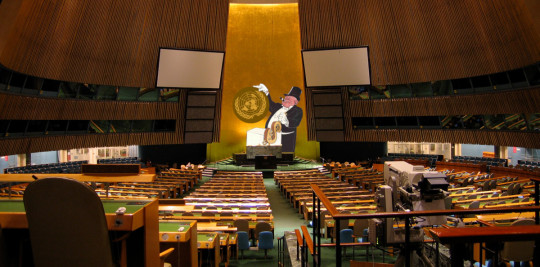
I'm on tour with my new, nationally bestselling novel The Bezzle! Catch me next weekend (Mar 30/31) in ANAHEIM at WONDERCON, then in Boston with Randall "XKCD" Munroe (Apr 11), then Providence (Apr 12), and beyond!

Back in the 1950s, a new, democratically elected Iranian government nationalized foreign oil interests. The UK and the US then backed a coup, deposing the progressive government with one more hospitable to foreign corporations:
https://en.wikipedia.org/wiki/Nationalization_of_the_Iranian_oil_industry
This nasty piece of geopolitical skullduggery led to the mother-of-all-blowbacks: the Anglo-American puppet regime was toppled by the Ayatollah and his cronies, who have led Iran ever since.
For the US and the UK, the lesson was clear: they needed a less kinetic way to ensure that sovereign countries around the world steered clear of policies that undermined the profits of their oil companies and other commercial giants. Thus, the "investor-state dispute settlement" (ISDS) was born.
The modern ISDS was perfected in the 1990s with the Energy Charter Treaty (ECT). The ECT was meant to foam the runway for western corporations seeking to take over ex-Soviet energy facilities, by making those new post-Glasnost governments promise to never pass laws that would undermine foreign companies' profits.
But as Nick Dearden writes for Jacobin, the western companies that pushed the east into the ECT failed to anticipate that ISDSes have their own form of blowback:
https://jacobin.com/2024/03/energy-charter-treaty-climate-change/
When the 2000s rolled around and countries like the Netherlands and Denmark started to pass rules to limit fossil fuels and promote renewables, German coal companies sued the shit out of these governments and forced them to either back off on their democratically negotiated policies, or to pay gigantic settlements to German corporations.
ISDS settlements are truly grotesque: they're not just a matter of buying out existing investments made by foreign companies and refunding them money spent on them. ISDS tribunals routinely order governments to pay foreign corporations all the profits they might have made from those investments.
For example, the UK company Rockhopper went after Italy for limiting offshore drilling in response to mass protests, and took $350m out of the Italian government. Now, Rockhopper only spent $50m on Adriatic oil exploration – the other $300m was to compensate Rockhopper for the profits it might have made if it actually got to pump oil off the Italian coast.
Governments, both left and right, grew steadily more outraged that ISDSes tied the hands of democratically elected lawmakers and subordinated their national sovereignty to corporate sovereignty. By 2023, nine EU countries were ready to pull out of the ECT.
But the ECT had another trick up its sleeve: a 20-year "sunset" clause that bound countries to go on enforcing the ECT's provisions – including ISDS rulings – for two decades after pulling out of the treaty. This prompted European governments to hit on the strategy of a simultaneous, mass withdrawal from the ECT, which would prevent companies registered in any of the ex-ECT countries from suing under the ECT.
It will not surprise you to learn that the UK did not join this pan-European coalition to wriggle out of the ECT. On the one hand, there's the Tories' commitment to markets above all else (as the Trashfuture podcast often points out, the UK government is the only neoliberal state so committed to austerity that it's actually dismantling its own police force). On the other hand, there's Rishi Sunak's planet-immolating promise to "max out North Sea oil."
But as the rest of the world transitions to renewables, different blocs in the UK – from unions to Tory MPs – are realizing that the country's membership in ECT and its fossil fuel commitment is going to make it a world leader in an increasingly irrelevant boondoggle – and so now the UK is also planning to pull out of the ECT.
As Dearden writes, the oil-loving, market-worshipping UK's departure from the ECT means that the whole idea of ISDSes is in danger. After all, some of the world's poorest countries are also fed up to the eyeballs with ISDSes and threatening to leave treaties that impose them.
One country has already pulled out: Honduras. Honduras is home to Prospera, a libertarian autonomous zone on the island of Roatan. Prospera was born after a US-backed drug kingpin named Porfirio Lobo Sosa overthrew the democratic government of Manuel Zelaya in 2009.
The Lobo Sosa regime established a system of special economic zones (known by their Spanish acronym, "ZEDEs"). Foreign investors who established a ZEDE would be exempted from Honduran law, allowing them to create "charter cities" with their own private criminal and civil code and tax system.
This was so extreme that the Honduran supreme court rejected the plan, so Lobo Sosa fired the court and replaced them with cronies who'd back his play.
A group of crypto bros capitalized on this development, using various ruses to establish a ZEDE on the island of Roatan, a largely English-speaking, Afro-Carribean island known for its marine reserve, its SCUBA diving, and its cruise ship port. This "charter city" included every bizarre idea from the long history of doomed "libertarian exit" projects, so ably recounted in Raymond Craib's excellent 2022 book Adventure Capitalism:
https://pluralistic.net/2022/06/14/this-way-to-the-egress/#terra-nullius
Right from the start, Prospera was ill starred. Paul Romer, the Nobel-winning economist most closely associated with the idea of charter cities, disavowed the project. Locals hated it – the tourist shops and restaurants on Roatan all may sport dusty "Bitcoin accepted here" signs, but not one of those shops takes cryptocurrency.
But the real danger to Prospera came from democracy itself. When Xiomara Castro – wife of Manuel Zelaya – was elected president in 2021, she announced an end to the ZEDE program. Prospera countered by suing Honduras under the ISDS provisions of the Central America Free Trade Agreements, seeking $10b, a third of the country's GDP.
In response, President Castro announced her country's departure from CAFTA, and the World Bank's International Centre for Settlement of Investment Disputes:
https://theintercept.com/2024/03/19/honduras-crypto-investors-world-bank-prospera/
An open letter by progressive economists in support of President Castro condemns ISDSes for costing latinamerican countries $30b in corporate compensation, triggered by laws protecting labor rights, vulnerable ecosystems and the climate:
https://progressive.international/wire/2024-03-18-economists-the-era-of-corporate-supremacy-in-the-international-trade-system-is-coming-to-an-end/en
As Ryan Grim writes for The Intercept, the ZEDE law is wildly unpopular with the Honduran people, and Merrick Garland called the Lobo Sosa regime that created it "a narco-state where violent drug traffickers were allowed to operate with virtual impunity":
https://theintercept.com/2024/03/19/honduras-crypto-investors-world-bank-prospera/
The world's worst people are furious and terrified about Honduras's withdrawal from its ISDS. After 60+ years of wrapping democracy in chains to protect corporate profits, the collapse of the corporate kangaroo courts that override democratic laws represents a serious threat to oligarchy.
As Dearden writes, "elsewhere in the world, ISDS cases have been brought specifically on the basis that governments have not done enough to suppress protest movements in the interests of foreign capital."
It's not just poor countries in the global south, either. When Australia passed a plain-packaging law for tobacco, Philip Morris relocated offshore in order to bring an ISDS case against the Australian government in a bid to remove impediments to tobacco sales:
https://isds.bilaterals.org/?philip-morris-vs-australia-isds
And in 2015, the WTO sanctioned the US government for its "dolphin-safe" tuna labeling, arguing that this eroded the profits of corporations that fished for tuna in ways that killed a lot of dolphins:
https://theintercept.com/2015/11/24/wto-ruling-on-dolphin-safe-tuna-labeling-illustrates-supremacy-of-trade-agreements/
In Canada, the Conservative hero Steven Harper entered into the Canada-China Foreign Investment Promotion and Protection Agreement, which banned Canada from passing laws that undermined the profits of Chinese corporations for 31 years (the rule expires in 2045):
https://www.vancouverobserver.com/news/harper-oks-potentially-unconstitutional-china-canada-fipa-deal-coming-force-october-1
Harper's successor, Justin Trudeau, went on to sign the Canada-EU Trade Agreement that Harper negotiated, including its ISDS provisions that let EU corporations override Canadian laws:
https://www.cbc.ca/news/politics/trudeau-eu-parliament-schulz-ceta-1.3415689
There was a time when any challenge to ISDS was a political third rail. Back in 2015, even hinting that ISDSes should be slightly modified would send corporate thinktanks into a frenzy:
https://www.techdirt.com/2015/07/20/eu-proposes-to-reform-corporate-sovereignty-slightly-us-think-tank-goes-into-panic-mode/
But over the years, there's been a growing consensus that nations can only be sovereign if corporations aren't. It's one thing to treat corporations as "persons," but another thing altogether to elevate them above personhood and subordinate entire nations to their whims.
With the world's richest countries pulling out of ISDSes alongside the world's poorest ones, it's feeling like the end of the road for this particularly nasty form of corporate corruption.
And not a moment too soon.

If you'd like an essay-formatted version of this post to read or share, here's a link to it on pluralistic.net, my surveillance-free, ad-free, tracker-free blog:
https://pluralistic.net/2024/03/27/korporate-kangaroo-kourts/#corporate-sovereignty

Image:
ChrisErbach (modified)
https://commons.wikimedia.org/wiki/File:UnitedNations_GeneralAssemblyChamber.jpg
CC BY-SA 3.0
https://creativecommons.org/licenses/by-sa/3.0/deed.en
#pluralistic#isds#investor state dispute settlement#steven harper#canada#canpoli#ukpoli#honduras#prospera#roatan#Energy Charter Treaty#ect#eu#rockhopper#world bank#charter cities#cryptocurrency#libertarian exit#Xiomara Castro
220 notes
·
View notes
Text
“I sometimes hear people say that Russia was forced to attack Ukraine because Ukrainians wanted to join NATO. Those people also often say that NATO promised it would not expand to the East, but later broke this promise. And this, allegedly, is the reason why Russia keeps attacking its neighbors.
If you have ever heard people say something like that, please know that this is not true. And it will take me less than five minutes to prove with facts that both statements are false.
First, let's have a look at the timeline of events.
Russia first invaded Ukraine in February 2014 by occupying the Crimea peninsula. At that moment, Ukraine was a neutral country by law and expressed no intention of joining NATO whatsoever. For instance, during the Revolution of Dignity, the protesters insisted on Ukraine joining the EU, not NATO. It was only in autumn 2014, after many months of war, that Ukraine abandoned neutrality.
So what came first? Russia attacking Ukraine, or Ukraine wanting to join NATO?
The answer is clear.
Had Russia not threatened Ukraine's existence, there would be no reason for our country to seek collective security. So please do not repeat the lie that, I quote, “Russia attacked because Ukraine wanted to join NATO,” end of quote. This does not correspond with the facts.
Now let's have a look at the story of NATO allegedly promising not to expand to the East.
If you ask people who say this, when exactly, such a promise was made and who made it, most of them will not be able to provide a clear answer. Spoiler, because no such promise has ever been made and the whole story is a Russian fairy tale.
Those more sophisticated will tell you that the promise was made to the President of the USSR, Mikhail Gorbachev. They may even refer to the 1990 U.S.-Soviet negotiations on the reunification of Germany. Again, let’s consider the timeline.
In summer 1990, when these talks were held, the Soviet analog of NATO, the Warsaw Pact, still existed. Its dissolution, let alone the Soviet Union's dissolution, was not on the cart. No one even talked about it or imagined it. It was only next year, in 1991 that the Warsaw Pact, and later the USSR, quite unexpectedly ceased to exist.
Now explain to me just how the very issue could be even discussed in the summer of 1990. It is not surprising that Mikhail Gorbachev later himself refuted this falsehood. When asked by a journalist whether any such promise had been made, he said this was a myth.
Now let's look at it from another perspective. How could NATO even promise anything like that?
Initially, it is not NATO that decides which country joins it. Countries themselves need to want it. And actually, the membership criteria are very difficult. It requires a lot of political will and reform. All the NATO members that joined it after 1991, really wanted to be part of it.
Their people wanted this.
And here comes the most uncomfortable question for Russia: Why were all of the nations that had been part of the Soviet Union or the Socialist bloc so eager and desperate to join NATO?
Well, maybe because in three decades, Russia has invaded or incited war in at least three of its neighbors, Moldova, Georgia and Ukraine. At the same time, Russia has not dared to invade any of its NATO neighbors.
Do you see the pattern?
The only reason for countries in the vicinity of Russia to seek NATO membership has always been and remains the need to protect their people from Russia.
Therefore, Moscow has only itself to blame for the fact that all of the central European and Baltic nations ran away from it and hid under the NATO umbrella as quickly as they could.
Do not let Russian officials or their supporters in the West fool you. Russia attacked Ukraine not because NATO expanded to the East, or because Ukraine wanted to join NATO. Russia attacked because it denies Ukraine's right to exist and wants to conquer our land and kill our people. It is through our shared strength that we can and must stop Russia and put an end to its aggressive plans for the rest of Europe.
For this to happen, keep supporting Ukraine and don't buy Russian lies.”
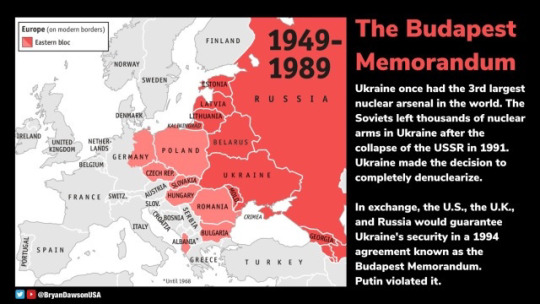
👉🏿 https://www.brookings.edu/blog/up-front/2014/11/06/did-nato-promise-not-to-enlarge-gorbachev-says-no/
👉🏿 https://www.tumblr.com/odinsblog/686191406300184576/appeasement-does-not-work-appeasement-didnt
👉🏿 https://www.tumblr.com/odinsblog/684530801484922880/believing-putins-reasons-for-invading-ukraine
👉🏿 https://www.tumblr.com/odinsblog/742088177664344064/violated-agreements-1991-russia-cosigns
#politics#ukraine#russia#dmytro kuleba#russian propaganda#nato#russian colonialism#nato expansion#russian imperialism#mikhail gorbachev#russia is a terrorist state#warsaw pact#russian expansion#russian fascism ☭#soviet union#tankies#vladimir putin is a war criminal#baltic states#🇺🇦
82 notes
·
View notes
Text

European Union seeks to strengthen their allyship with additions of Ukraine and Moldova.
🇺🇦! 🇲🇩!
This is a blow to Russia and other authoritarians in the region.
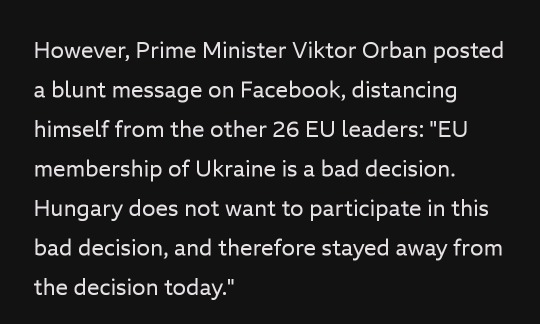
Who else is against the Ukraine membership to the EU? None other than CPAC/MAGA idol Viktor Orban of Hungary. The same Orban who gets star treatment from knobs like Tucker Carlson.
So for clarification: Democratic European allies and Ukraine would be good for America.
Those against a strong EU would be Russia, Hungary, and MAGA traitors.
143 notes
·
View notes
Text
75 years ago, the NATO "Defensive" alliance was created to counter a perceived fear of communist expansion into Europe. Regardless of the fact that there was no plausible evidence that the Soviets ever planned to invade "Europe," When the Soviet Union ceased to exist, so did NATO's marginal rationale for existence. However, the "defensive" alliance kept expanding against the advice of many western voices and those of the Russians. These protests and warnings were, of course, ignored as the Alliance continued to peddle a North American world view to Europe and its expanding Eastern European membership. NATO today has proved itself to be a fractious weapons sales scam and political platform, not a military alliance. It has energetically participated in numerous illegal and brutal unilateral military actions serving the political rationale of the Washington, London, and Brussels elite. From Belgrade to Tripoli, NATO has delivered its brand of "freedom" by bombing civilians, their homes, and societies. The coming collapse of the Ukrainian misadventure represents such an existential threat to the viability of this paper tiger that it will contemplate almost any avenue other than acceptance of failure. Rather than defending Europe from War, NATO looks destined to become part of a self designed self-fulfilling prophecy of War and destruction. Rember, nothing of the Machine ever works against the machine, and NATO is, despite what we are told, a giant profit Mill and ponzi scheme, peddling fear to sell weapons while the citizens of Europe face poverty and societal discontent. Russia and the Russians have no designs or desire for a War with NATO, no serious academic or political analysts outside of the echo chamber of Atlantasist fantasy believes that. Remember, if there's a people on earth that understand the devastation of war, it's the Russians. If you actually want to examine the engine of the Ukraine war (and all other post WW2 conflicts) and any conflict thay flows from it, lift the bonnet on the Washington and London elites and their greasy association with the corporations profiting from the War. Neither they nor their bureaucratic appointees will see their children, brothers, or fathers doe in a War with Russia or indeed wIth China. That is an honour they will bestow on the ordinary taxpayers of the EU and US, and while they're at it, they'll also convince you to pay for it all too.
Il y a 75 ans l’OTAN était créée pour contrer la peur perçue d’une expansion communiste en Europe. Indépendamment du fait qu’il n’existait aucune preuve plausible que les Soviétiques envisageaient d’envahir « l’Europe », lorsque l’Union soviétique a cessé d’exister, la justification marginale de l’existence de l’OTAN a également disparu. Cependant, l’alliance « défensive » a continué à s’étendre contre l’avis de nombreuses voix occidentales et contre l’avis des Russes. Ces protestations et avertissements ont bien sûr été ignorés alors que l’Alliance a continué à colporter une vision nord-américaine du monde à l’Europe et à son adhésion croissante à l’Europe de l’Est. Aujourd’hui, l’OTAN s’est révélée être une escroquerie de vente d’armes et une plate-forme politique, et non une alliance militaire. Il a participé énergiquement à de nombreuses actions militaires unilatérales illégales et brutales servant la logique politique des élites de Washington, de Londres et de Bruxelles. De Belgrade à Tripoli, l’OTAN a défendu sa « liberté » en bombardant les civils, leurs maisons et leurs sociétés. L’effondrement prochain de la mésaventure ukrainienne représente une telle menace existentielle pour la viabilité de ce tigre de papier qu’il envisagera presque toutes les voies autres que l’acceptation de l’échec. Plutôt que de défendre l’Europe contre la guerre, l’OTAN semble destinée à faire partie d’une prophétie auto-réalisatrice de guerre et de destruction. N’oubliez pas que rien de la Machine ne fonctionne jamais contre la machine, et que l’OTAN est, malgré ce qu’on nous dit, une gigantesque usine à profit et une chaîne de Ponzi, colportant la peur pour vendre des armes alors que les citoyens européens sont confrontés à la pauvreté et au mécontentement sociétal. La Russie et les Russes n’ont ni l’intention ni le désir d’une guerre avec l’OTAN, aucun analyste universitaire ou politique sérieux en dehors de la chambre d’écho du fantasme atlantasiste ne le croit. N’oubliez pas que s’il y a un peuple sur terre qui comprend les ravages de la guerre, c’est bien les Russes. Si vous voulez réellement examiner le moteur de la guerre en Ukraine (et tous les autres conflits de l’après-Seconde Guerre mondiale) et tout conflit qui en découle, levez le chapeau sur les élites de Washington et de Londres et leur association graisseuse avec les entreprises qui profitent de la guerre. Ni eux ni leurs représentants bureaucratiques ne verront leurs enfants, leurs frères ou leurs pères participer à une guerre avec la Russie ou même avec la Chine. C’est un honneur qu’ils accorderont aux contribuables ordinaires de l’UE et des États-Unis, et pendant qu’ils y seront, ils vous convaincront également de payer pour tout cela également.
Otan = Organisation du traité de l'Atlantique nord
Nato = National Association of Theatre Owners
22 notes
·
View notes
Text
Political offender classification: Class 2
“Class 2 offense is a societally harmful act which undermines the authority of the East European Socialist Union government and its social and political order.”
“Class 2 offenders are potentially dangerous elements committing stated crimes with a possible deliberate anti-socialist intent.”
Rules:
Can be applied to minors aged 16 and older
Used for most class 1 offenses during martial law
Used for class 1 repeat offenders
May be used for class 3 offenses when the state/region is in a great need of agricultural labor
Mostly used in peacetime
Offenses:
Non-reporting on class 4 crimes
Contribution to class 3 crimes
Illegal country border crossing to an ally state*
Verbal anti-government propaganda in peacetime
Personal acts of economical sabotage
Unapproved foreign (Western) media possession
Showing support to enemy states or regimes
Unregistered media broadcasting device possession**
Unregistered foreign property possession
Leaking or disclosure of confidential information
Penalties:
Limitations on certain jobs, ranks and positions
Demotion from Party member to Party candidate
Termination from the Party (in more severe cases)
Forced resettlement to remote areas with corrective labor for up to a few years
Deportation to labor communes for up to 10 years
Protection status:
All remaining constitutional rights legally and actually protected (may experience discrimination)
Further restrictions:
Not allowed to get certain jobs or ranks
Not allowed to be registered within EESU capital, region capitals and biggest cities (usually from 3 to 20 years after release)
Political literacy courses after resettlement or release from the commune
Life prospects:
Back to freedom after detention or release from the commune
Back to life in a remote town/settlement after serving penalty
Job, movement and travel prospects reduced
More often become political crime suspects later in life; may be arrested as class 3-4 while in labor commune or resettlement
Rehabilitation possibility:
Rehabilitated with a political criminal record after finishing courses
May be fully rehabilitated with charges dropped and rights restored for labor or political achievements
Party membership can be restored (usually a difficult process)
Class promotion/demotion possibility:
Promotion to class 1 for labor achievements and political loyalty
Demotion to class 3 if aggravating circumstances are found during investigation/detention
Demotion to class 3 if escaped from the labor commune
Prisoner use methods:
Cheap unskilled labor within their commune or resettlement place
Cheap labor in the offender’s skill field within their commune or resettlement place
May be used as voluntary unofficial informers
May be used in SSR*** for important projects
Legal documentation:
ID card stamped with a political criminal record mark
*Ally states (by 1960): USSR, Yugoslavia, China, North Korea. Yugoslavia is the most common EESU escape route aside from West Germany.
**TVs and radios, including DIY radio stations. Must be analyzed and approved by the government before purchase.
***Strategic Scientific Reserve (Science Division).
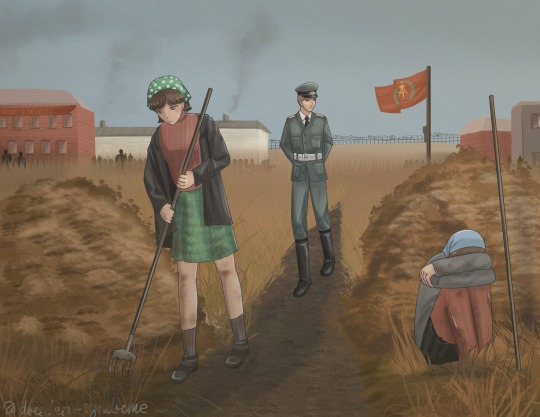
Picture: Ştefana Rusu and Ana-Maria Antonescu on the field work in a small labor commune. PUR Romania, 1965.
Art tag: @painful-pooch @prismpanic @generic-whumperz @suspicious-whumping-egg @onlywhump @whumpedydump @whumpthefifth @monarchthefirst @sunshiline-writes @project-xiii
Lore dump tag: @sweet-lost-husbands @whumpingandsmilinglikeanidiot
#not really whump again#whump#whump community#whumpblr#historical whump#totalitarian whump#whump art#whumpee#whump ideas#whump stuff
20 notes
·
View notes
Text
NATO allies should spend 3% of GDP on defence – Poland’s President
During his visit to Edmonton, Canada, Polish President Andrzej Duda called on other NATO countries to raise their defence spending to 3% of GDP, arguing that the security situation had changed, according to Euractiv.
What was adequate to the 2014 situation (…) certainly does not suffice.
Poland spent 4% of its GDP on defence in 2023, making the country one of the top performers in NATO in terms of military spending, well above the 2% of GDP the alliance states agreed to in 2014.
“We have to fortify ourselves so that no one will dare to attack us.”
Duda stated that NATO’s actions were “anything but leading up to a confrontation” with Russia. The president also announced on Monday that Poland was ready to host nuclear weapons on its territory as part of a nuclear exchange programme. He confirmed that he had held talks on the issue with the US administration during a recent visit.
Read more HERE
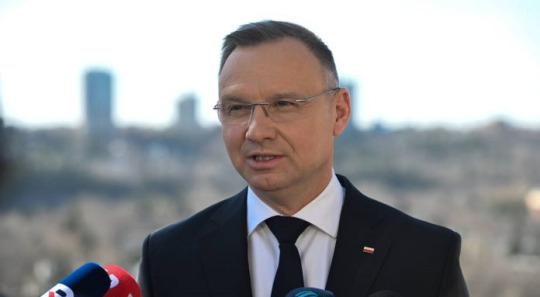
#world news#world politics#news#europe#european news#european union#eu politics#eu news#poland#poland news#poland politics#andrzej duda#nato#nato news#nato allies#nato expansion#nato alliance#nato membership#military spending#military#soldiers
0 notes
Text
Scholz Heads to Western Balkans to Help EU Membership Bid | World News
Scholz Heads to Western Balkans to Help EU Membership Bid | World News
BERLIN (Reuters) – German Chancellor Olaf Scholz sets off on a two-day tour of the Western Balkans on Friday in a bid to help reinvigorate their long-stalled campaign for European Union membership, ease regional tensions and fend off the influence of rival powers such as Russia.
Russia’s invasion of Ukraine has lent a new sense of urgency to the need to tie Montenegro, Serbia, Albania, North…

View On WordPress
#Albania#Balkans#bid#Collections: World#Europe#European Union#Germany#Greece#Heads#Membership#Montenegro#News#Reuters#Scholz#Serbia#Western#World#World News
0 notes
Text
The myth of Russian humiliation
Looking back over the past quarter-century, it isn’t easy to name a Western policy that can truly be described as a success. The impact of Western development aid is debatable. Western interventions in the Middle East have been disastrous.
But one Western policy stands out as a phenomenal success, particularly when measured against the low expectations with which it began: the integration of Central Europe and the Baltic States into the European Union and NATO. Thanks to this double project, more than 90 million people have enjoyed relative safety and relative prosperity for more than two decades in a region whose historic instability helped launch two world wars.
These two “expansions,” which were parallel but not identical (some countries are members of one organization but not the other), were transformative because they were not direct leaps, as the word “expansion” implies, but slow negotiations. Before joining NATO, each country had to establish civilian control of its army. Before joining the European Union, each adopted laws on trade, judiciary, human rights. As a result, they became democracies. This was “democracy promotion” working as it never has before or since.
But times change, and the miraculous transformation of a historically unstable region became a humdrum reality. Instead of celebrating this achievement on the 25th anniversary of the fall of the Berlin Wall, it is now fashionable to opine that this expansion, and of NATO in particular, was mistaken. This project is incorrectly “remembered” as the result of American “triumphalism” that somehow humiliated Russia by bringing Western institutions into its rickety neighborhood. This thesis is usually based on revisionist history promoted by the current Russian regime — and it is wrong.
For the record: No treaties prohibiting NATO expansion were ever signed with Russia. No promises were broken. Nor did the impetus for NATO expansion come from a "triumphalist" Washington. On the contrary, Poland's first efforts to apply in 1992 were rebuffed. I well remember the angry reaction of the U.S. ambassador to Warsaw at the time. But Poland and others persisted, precisely because they were already seeing signs of the Russian revanchism to come.
When the slow, cautious expansion eventually took place, constant efforts were made to reassure Russia. No NATO bases were placed in the new member states, and until 2013 no exercises were conducted there. A Russia-NATO agreement in 1997 promised no movement of nuclear installations. A NATO-Russia Council was set up in 2002. In response to Russian objections, Ukraine and Georgia were, in fact, denied NATO membership plans in 2008.
Meanwhile, not only was Russia not "humiliated" during this era, it was given de facto "great power" status, along with the Soviet seat on the U.N. Security Council and Soviet embassies. Russia also received Soviet nuclear weapons, some transferred from Ukraine in 1994 in exchange for Russian recognition of Ukraine's borders. Presidents Clinton and Bush both treated their Russian counterparts as fellow "great power" leaders and invited them to join the Group of Eight — although Russia, neither a large economy nor a democracy, did not qualify.
During this period, Russia, unlike Central Europe, never sought to transform itself along European lines. Instead, former KGB officers with a clearly expressed allegiance to the Soviet system took over the state in league with organized crime, seeking to prevent the formation of democratic institutions at home and to undermine them abroad. For the past decade, this kleptocratic clique has also sought to re-create an empire, using everything from cyberattacks on Estonia to military invasions of Georgia and now Ukraine, in open violation of that 1994 agreement — exactly as the Central Europeans feared.
Once we remember what actually happened over the past two decades, as opposed to accepting the Russian regime’s version, our own mistakes look different. In 1991, Russia was no longer a great power in either population or economic terms. So why didn’t we recognize reality, reform the United Nations and give a Security Council seat to India, Japan or others? Russia did not transform itself along European lines. Why did we keep pretending that it had? Eventually, our use of the word “democracy” to describe the Russian political system discredited the word in Russia itself.
The crisis in Ukraine, and the prospect of a further crisis in NATO itself, is not the result of our triumphalism but of our failure to react to Russia’s aggressive rhetoric and its military spending. Why didn’t we move NATO bases eastward a decade ago? Our failure to do so has now led to a terrifying plunge of confidence in Central Europe. Countries once eager to contribute to the alliance are now afraid. A string of Russian provocations unnerve the Baltic region: the buzzing of Swedish airspace, the kidnapping of an Estonian security officer.
Our mistake was not to humiliate Russia but to underrate Russia’s revanchist, revisionist, disruptive potential. If the only real Western achievement of the past quarter-century is now under threat, that’s because we have failed to ensure that NATO continues to do in Europe what it was always meant to do: deter. Deterrence is not an aggressive policy; it is a defensive policy. But in order to work, deterrence has to be real. It requires investment, consolidation and support from all of the West, and especially the United States. I’m happy to blame American triumphalism for many things, but in Europe I wish there had been more of it.
20 notes
·
View notes
Text
If we want a prosperous Ukraine with a viable path toward liberal governance and European Union membership, we will have to concede that it cannot be a NATO or U.S. ally, and that this neutral Ukraine must have verifiable limits on the types and quantities of weapons it may hold. If we refuse to agree to those terms, Russia will quite probably turn Ukraine into a dysfunctional wreck incapable of rebuilding itself, allying with the West, or constituting a military threat to Russia.
Russian progress is not yet evident on the map, where the battle lines have not moved appreciably over the past year. Ukraine’s counteroffensive failed to break through Russian defenses, and Russia has not pushed Ukrainian forces significantly westward. An observer comparing territorial holdings in January 2023 with January 2024 might reasonably conclude that the war has become a stalemate.
But this picture is misleading. The Kremlin is almost certainly not seeking such a breakthrough, at least not yet. Rather, it is methodically grinding down Ukraine’s capacity not only to wage war, but also to reconstitute a post-war military, by killing and wounding enormous numbers of Ukrainian soldiers and exhausting Ukrainian and Western arsenals of arms and ammunition. Ukraine is running short of artillery shells, and the U.S. and Europe cannot manufacture new ones quickly enough to meet Ukraine’s needs. Russian barrages of long-range air and missile strikes are increasingly overwhelming the capacity of Ukrainian air defenses, and the West simply lacks the ability to continue providing Patriot missiles or other advanced air defense systems.
It is quite true, as the Biden administration has warned, that ending U.S. aid to Kyiv would quickly result in Ukraine’s collapse. Sufficient aid to help Ukraine to stand successfully on the defensive should therefore continue. But what U.S. policymakers need to understand and honestly acknowledge is that absent a compromise peace settlement, massive levels of aid will have to continue not just for the coming year, but indefinitely. There is very little realistic chance of the West being able to outlast Russia and force it to accept peace on Ukrainian terms. The controversies in Congress over aid to Ukraine reflect these realities and are unlikely to diminish.
Under such circumstances, for the Biden administration to pledge American support to Ukraine for “as long as it takes” to defeat Russia is unwise, and even dishonest. It is widely believed in Washington that the failure of Ukraine’s counteroffensive means that the West has no choice but to back Ukraine’s fight against Russia for many years to come. Seeking compromise with Moscow is regarded as not only undesirable but also futile. Lacking alternatives, we must stay the present course, hoping that time will improve Ukraine’s position.
But time is not on Ukraine’s side, either militarily or economically, and so Ukraine’s position in any future negotiations may well be very much worse than at present. Russia’s population is at least four times that of Ukraine and its GDP 14 times. The Russian army is far better led and more tactically adept than it was at the start of the war, and Western sanctions show no signs of being able to cripple the Russian economy, which is more and more geared for war.
And whatever Brussels may say, as long as the war continues it is exceptionally unlikely that Ukraine will be able to develop economically and begin the extremely difficult process of joining the European Union.
Most importantly, the United States has not tested the assumption that Russian President Vladimir Putin has no interest in talking. It is indeed very likely that Putin believes Russia now has the upper hand in the war and can afford to wait. Nonetheless, Putin has repeatedly insisted that Russia is ready to talk, and also that Washington – not Kyiv – makes the key decisions in the war and therefore it is for Washington to engage in talks.
This may be posturing; but it is also possible that Putin recognizes that absent a settlement, Russia is headed toward the dangers of a permanently volatile confrontation with the West, an economy distorted by the demands of military production, and a constricting degree of dependence on China. Russians’ concerns about these problems are likely to grow as their fears they may lose the war in Ukraine diminish.
It is further alleged that Putin believes that a future Donald Trump presidency would be the Kremlin’s best hope for a settlement on Russian terms. However, Trump’s first term produced some friendly rhetoric but much hostile action toward Moscow, including withdrawal from nuclear arms agreements and increased flows of U.S. weapons and training for the Ukrainian army.[...]
Given that Russia now has the advantage on the battlefield and senses that time is on its side, to get Putin to end the war and end his ambition to subjugate Ukraine or seize more territory, Washington will have to offer some serious incentives. These will need to include showing that the U.S. is prepared to meet Russian concerns about the U.S. and NATO security threat to Russia (concerns that are genuinely held throughout the Russian establishment).
This will mean agreement to a Ukrainian treaty of neutrality, with security guarantees for Ukraine, that will allow that country to follow neutral Finland and Austria during the Cold War and develop as a free market democracy. Western sanctions against Russia would need at least to be eased if not suspended, but with a binding commitment that they would automatically resume if Russia launched new aggression.
An agreement along these lines would be extremely painful for both Ukraine and the Biden administration. However, we should see preserving the independence of 80 percent of Ukraine as a real victory, even if not a complete one. It is certainly far better than what appears to be the alternative: a war of attrition with dreadful losses for Ukraine, leading sooner or later to a far greater Ukrainian defeat.
11 Jan 24
52 notes
·
View notes
Text
Lula’s Confused About Who Attacked Whom in Ukraine
Having defended democracy at home, Brazil inspired hope that it might sympathize with the struggle for freedom elsewhere too. Apparently not.
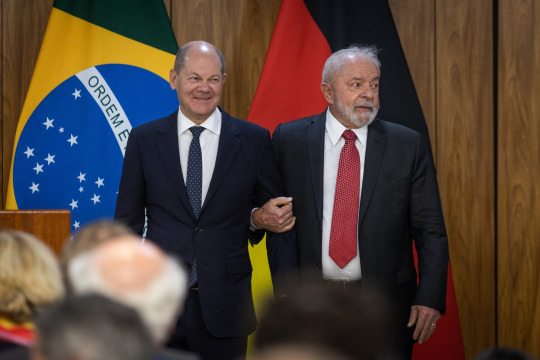
With democrats like Brazilian President Luiz Inacio Lula da Silva, who needs autocrats? Shame on Lula for pretending that Kyiv, NATO and the European Union are as much to blame for Russia’s genocidal war against Ukraine as the wannabe Tsar in the Kremlin, Vladimir Putin. Shame on Lula for doing nothing to help Ukraine.
Lula was sworn into his old job — he was already president between 2003 and 2010 — only one month ago. That followed the four-year stint of right-wing populist Jair Bolsonaro — “the Trump of the Tropics.” A week after Lula took over, pro-Bolsonaro mobs even ransacked federal buildings in Brasilia, in a farcical reprise of the attack on the US Capitol on Jan. 6, 2021. When Brazil’s institutions — and Lula — withstood that assault, much of the democratic world exhaled in relief.
“We’re all delighted that Brazil is back on the global stage,” Scholz beamed at Lula during his visit to Brasilia this week. “You guys have been sorely missed.” Lula spontaneously gave the chancellor a hug.
In particular, Scholz wants to broaden the alliance to support Ukraine and oppose Putin by including as many countries as possible in the “Global South.” Last year, for example, when he hosted the Group of Seven, a club of liberal democracies with large economies, he also invited India, Indonesia, South Africa and Senegal.
But it was Lula who not only rebuffed Scholz’s entreaties wholesale but also lost the plot entirely. “Brazil has no interest in passing on ammunition so that it will be used in the war,” Lula said at their joint press conference. “Brazil does not want to have any participation, even indirect.”
For a glimpse into Lula’s reasoning, it helps to read his comments in an interview with Time Magazine last year. “It’s not just Putin who is guilty,” Lula insisted. “The US and the EU are also guilty” — apparently for not being more categorical in ruling out Ukraine’s membership in NATO (which hasn’t even been up for discussion since 2008).
But Lula had more to say. Ukrainian President Volodymyr Zelenskiy may strike most people as an inspirational leader defying a brutal invasion. Not Lula. The Brazilian president believes Zelenskiy is “weird” and behaves like a publicity hound flitting from one TV camera to the next, when he should instead be “negotiating” — presumably about Ukraine’s capitulation. “This guy is as responsible as Putin for the war,” he said.
Come again?
Continue reading.
#brazil#ukraine#russia#politics#brazilian politics#ukraine crisis#luiz inacio lula da silva#foreign policy#international politics#mod nise da silveira#image description in alt
214 notes
·
View notes